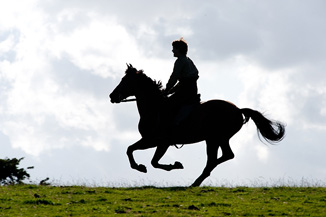Movie Review: War Horse
By Matthew Huntley
January 10, 2012
Maybe it was the epic, old-fashioned storytelling, or the touching bond depicted between man and animal. Whatever the reason, Steven Spielberg’s War Horse worked its way into my heart and I enjoyed it purely as a simple, fulfilling story. Thinking back on it, I smile because this is the type of film many people of various ages and backgrounds can enjoy together. It has a universal appeal because it’s about universal feelings and themes, like caring for a child or pet you’ve nurtured and watched grow; seeing promises all the way through; and basic survival. You can categorize it as a war picture, sure, but it doesn’t necessarily takes sides and label one country good and another evil, nor does it see things from a single point of view. War in this case serves as a mechanism for us to see how any human being - English, French, German, man, woman, adult, child - can be linked to others through his or her humanity. In this case, their humanity stems from the way they care for and react to the title character.
The story has the kind of classic tone that resonated in films of the 1930s, free of cynicism and filled to the brim with underlying hope. In Devon, Ireland, just before World War I, a poor farmer named Ted Narracott (Peter Mullan) hastily (and drunkenly) bids on a horse in a local auction to spite his smug landlord (David Thewlis). But the horse is too skinny and jumpy to pull a plow, which is what Narracott needs it for, and so he ends up with a seemingly useless animal and an even greater line of debt. His wife (Emily Watson) gives him one month to train it; otherwise she vows to return the horse herself and beseech the landlord for forgiveness. But their son, Albert (Jeremy Irvine), who saw the young thoroughbred come into the world, sees a golden opportunity to raise it as his own.
Albert names the horse Joey and teaches him some basic commands, but the horse is only good to him if he can pull a plow, and so Albert puts himself out there and proves he’s willing to do the same things he asks of the horse, as if the two are equals. If he wants Joey to wear a strap around his neck, Albert will wear one too. Like most young people with a love for animals, Albert instinctually knows what to do so Joey doesn’t feel threatened, like when he feeds him oats for the first time and carefully avoids looking him in the eye.
Naturally, Albert and Joey form a bond, which might not have come across as strongly or touchingly had Spielberg and screenwriters Richard Hall and Richard Curtis, working from the novel by Michael Morpurgo, not taken the time to develop their friendship with patience and credible action. The film is anything but hasty in the way it shows the horse forming relationships with the human characters and we sense it learning and appreciating all that is being done for him. After all, this is really the horse’s story, a concept that comes across clearly and without irony, thus allowing us to identify with Joey and care for him deeply.
Continued:
1
2
|
|
|
|




